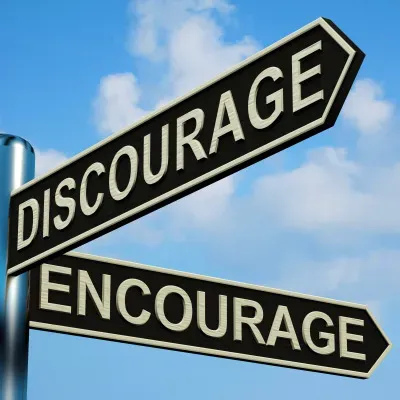
“Exactly how long has this light been on in your car?” The text came shortly after my husband had pulled out of the driveway to run to the grocery store. “Which one?” I replied.
While he was referring to the low fuel light (long enough that I would need to get gas soon but recent enough that the grocery trip should be fine), he might have just as easily been referring to my check engine light or my tire pressure light, both of which had come on that morning.
Thankfully, my husband is much better at recognizing a potential hazard and got the engine tested (nothing serious) and put some air in my tires…while he was also filling the tank.
While I like to think of myself as a fairly practical person, it turns out when it comes to my car, I live in a fantasy world where lights mean nothing and give no reason for alarm. But those lights are warnings, letting me know that if something doesn’t change, I’m headed for an unexpected pit stop.
Many of us are living life with warning lights going off every morning as well– they usually sound like, “I can’t study right now, I’m too busy.” “I’m too swamped to take a break.” “I’ll just grab whatever fast food I can eat quickly while I head to the next thing.” “Hobbies? I don’t even know how to get Sunday’s service ready, never mind taking time to do something fun!”
The truth is, our warning lights are blaring and if we don’t recognize the need for a change, we may end up watching our ministry break down, along with our relationships.
On a recent episode of the podcast, Jimbob spoke with our good friend, Frank Lewis, about self care for the Replant Pastor. Frank brought up some great points about the benefits of keeping our spiritual, physical, and mental health a priority doing the gritty and glorious work of replanting churches.
When we think of “self care,” we may be tempted to think that it is selfish or self-indulgent. But self care is actually defined by the World Health Organization as “the ability of individuals, families, and communities to promote health, prevent disease, maintain health, and cope with illness and disability with or without the support of a health worker.” Essentially, self care is anything we do so that we can be healthy, do our jobs, help and care for others, and do all the things we need to and want to accomplish in a day.
Types of Self Care

When we picture self care, we tend to limit it to spa treatments or solo activities, like reading or journaling. But there are countless ways to practice self care, and each of them can have benefits far beyond a 60 minute massage.
Physical Self Care
When we practice physical self care, we include eating healthier, exercising, and better sleeping habits. Perhaps the best reason for physical health is the need to be physically ready for the challenges replanters face each day. Many of you are bi-vocational, working two full-time jobs. Without discipline, it is easy to fall into a lifestyle of fast food and fatigue. Have you ever said, “I’m too tired to even go to sleep!” You may have stayed up later than you needed to, resulting in you feeling even worse the next day– and that lack of sleep will catch up to you, resulting in exhaustion and possibly even serious health effects. Eating well and taking care of your body enables you to keep giving your best in all facets of your ministry.
I recently started going to the gym on my lunch break four times per week. It isn’t much, just 30 minutes of cardio activity, but I feel better on the days I do it. I am better prepared for the tasks I need to accomplish. It also keeps me away from fast food and sitting in my car on my lunch break, which usually leaves me feeling sluggish for the rest of the day. Even as little as 30 minutes can have a profound impact on your overall health and well being.
Spiritual Self Care
We must also seek spiritual self care. The need for us to be spiritually healthy cannot be overstated. We are in a battle for people’s souls. To neglect our spiritual health can have eternal consequences. So often, pastors will study scripture for their sermon preparation and for their congregation’s needs, but they will fail to practice spiritual self care. Reading devotions, meditating on scripture, and praying to God are necessary disciplines to care for your own soul as you do for the souls of others.
In the book, Spiritual Disciplines for the Christian Life, Donald Whitney lays out some other disciplines that we often fail to incorporate into our lives. For example, when was the last time you practiced solitude? Remember when Jesus was ministering to communities and healing people, he would often retreat to be by himself for a while and simply pray. Jesus needed this time to gain energy and focus on his mission by spending time with the Father. Don’t neglect important tools like this in your personal life.
Emotional Self-Care
Another self care tool we need is emotional self care. Our emotions are like a gas tank– without constant refilling, we will eventually run out. As an old saying goes, “you can’t fill from an empty cup.” When we run on empty, we have nothing left for those who need us.
I distinctly remember one season of ministry where I was just emotionally drained. Unfortunately, I had given so much to others that when my own child came to me with a very real emotional need, I was too depleted to empathize or help. Emotional self care is just as important as physical and spiritual self care. Caring for your emotions can include both social and individual care. Spending time with friends who lift you up and support you can refill your tank in much the same way taking time away for a vacation or sabbatical can.
Mental Self-Care
In addition to your physical body, your spiritual soul, and your emotions, your brain needs care, too. Mental self care is so important to a pastor. When you spend so much time in study and cerebral activities, exercising your brain in new ways helps to keep it stimulated and engaged. Mental self care can include artistic endeavors like writing poetry or music, or working with your physical hands in woodworking or other hands-on hobbies. Self care for your brain can even mean learning a new activity or a new language.
I’ve often heard that if you work with your hands a lot, take a break by resting with your mind (like reading). Or if you work with your mind a lot, take a break by resting with your hands (working on a project). These small steps help more than we realize.

Barriers to Self Care
Often, when we talk about self care, we can see the benefit, and we understand the need. Unfortunately, we still can’t seem to find the time for it. “I’m too busy for another thing on my schedule, even self care!” Might I offer this truth?
We can’t afford NOT to practice self care. In fact, self care may need to be penciled into the calendar FIRST.
Let’s go back to my car– if I had continued to allow my car to run without gas, on tires that were going flat, with an engine light that was alerting me to a specific issue, how much longer could my car run? How long until I was on the side of the road, experiencing a breakdown?
Now think of yourself. How long can you go without self care before you experience a breakdown? I’m guessing it’s far less time than you think. Often the symptoms of a breakdown show up before we actually come to a complete stop. Symptoms that look like arguments with your spouse, impatience with your coworkers, irritation with your children, physical illness… You need to practice self care before you self-destruct.
The quickest way to make self care a priority is to pencil it in. Literally, pencil self care into your calendar. Make it a habit in your life that you refuse to break. I have a friend who takes a pottery class every Tuesday night. That night is as important to her as Sunday morning. She refuses to miss it. She recognizes the importance it has to her and the difference it makes in her life. In the same way, you must pencil in time with God, your friends, your family, and yourself.
A book we have used already in other blogs is Replenish by Lance Witt. In the book, Witt has a well-known quote that sums this topic up quite well. He says, “Never lose sight of the fact that the box (your ministry) is not as valuable as the gift (Jesus). And the only reason the box exists is to deliver the gift. You have dedicated your life to the gift, not to the box.”











